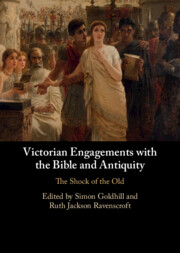3 results
Chapter 5 - The ‘High Victorian’
-
-
- Book:
- Nineteenth-Century Literature in Transition: The 1870s
- Published online:
- 30 January 2025
- Print publication:
- 06 February 2025, pp 107-126
-
- Chapter
- Export citation
Chapter 3 - The Liminal Premiership
-
- Book:
- The Impossible Office?
- Published online:
- 14 March 2024
- Print publication:
- 14 March 2024, pp 69-111
-
- Chapter
- Export citation

Victorian Engagements with the Bible and Antiquity
- The Shock of the Old
-
- Published online:
- 28 September 2023
- Print publication:
- 12 October 2023

